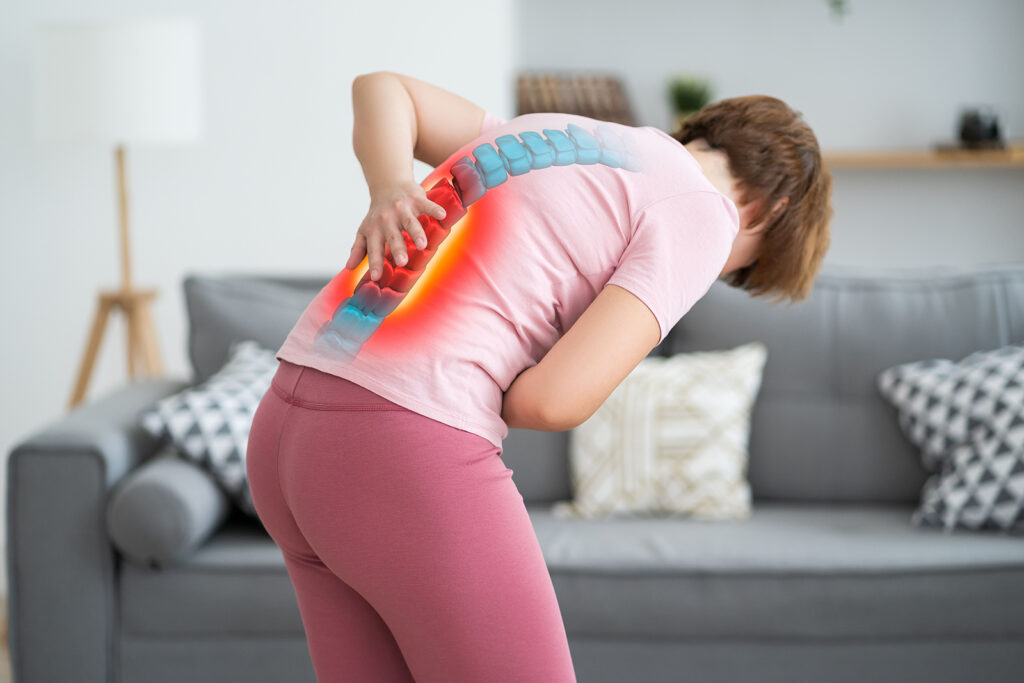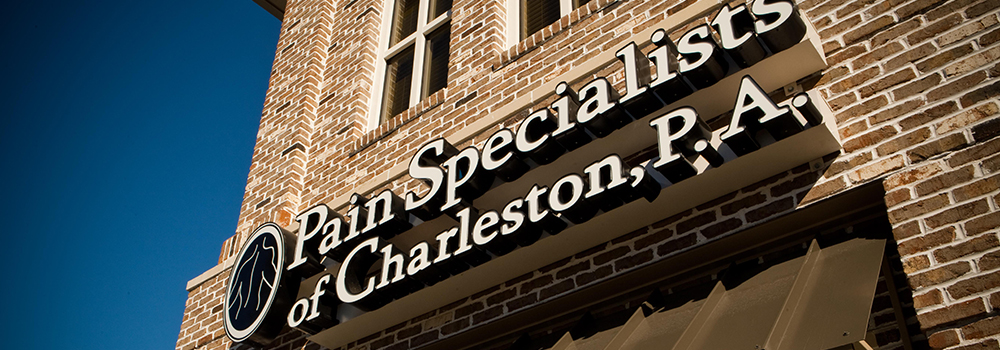Socrates once said, “If you would seek health, look first to the spine.”
The spine is one of the most important parts of the body, providing structure, support, and communication between your brain and the rest of your body. Contrary to popular belief, your spine is designed to withstand ample amounts of load and stress – but that does not mean it is unbreakable.

Too much pressure on or against the vertebrae in your spine may cause the bones to break and collapse, otherwise known as a compression fracture. These fractures can cause symptoms ranging from mild to severe, with pain serving as a reminder of the fragility of your body…
But pain doesn’t have to be forever.
Keep reading as our pain management physicians guide you through compression fractures and how we can help with pain management near you.
What is a Compression Fracture?
Compression fractures are small breaks or cracks in the bones that make up your spinal column or vertebrae. These fractures can cause the spine to weaken and eventually collapse.
Compression fractures are considered either stable or unstable.
Stable compression fractures refer to fractured bones that don’t move out of place. Unstable compression fractures have moved out of place, possibly interfering with nerves and tissue in the fractured area.
There are three types of compression fractures: wedge, crush, and burst.
- Wedge: This fracture forms on the front of the vertebra and takes on a wedge shape after the broken bone collapses.
- Crush: This break occurs in the entire vertebra, forcing the bone to collapse in on itself.
- Burst: This type of fracture is the most serious and requires immediate medical attention since the break causes bone pieces to spread out in multiple directions
Symptoms and Causes Behind Compression Fractures
While spinal compression fractures may sound as though increased pressure is required for the bone to break and collapse, this is not always the case.
Causes Behind Compression Fractures
One of the most common causes of compression fractures is osteoporosis. Osteoporosis is a disease that causes the structure and strength of the bones to change, resulting in bones that are too brittle and weak to adhere to normal amounts of pressure.
Forty percent of all women will have at least one spinal compression fracture due to osteoporosis by the time they reach 80 years old.
Other common causes of compression fractures include:
- Injuries or accidents: Such as slip and fall incidents, car accidents, or other forms of physical trauma
- Metastatic disease: The bones of the spine are a common place for many forms of cancer to spread or cancerous tumors to develop. Metastasis, the spread of cancer cells into various parts of the body, can cause the vertebra to weaken and collapse.
Symptoms of Compression Fractures
Compression fracture symptoms can range in severity, depending on the root cause.
For example, if a fracture is caused by a sudden injury or force, like a car accident, you may suffer from severe pain in your legs, arms, and back. However, if it occurs gradually over time, as seen in old age, the symptoms may be milder or even go unnoticed altogether.
Along with sudden back pain, common symptoms of compression fractures include:
- Limited mobility and flexibility
- Tingling sensation in your back
- Numbness in the back
- Tenderness at the fracture site
- Muscle weakness or spasms
- Hunched posture over time
- Gradual loss of height
If you believe you may be suffering from symptoms related to a stress fracture, contact our pain management clinic in Charleston as soon as possible.
How Serious is a Compression Fracture of the Spine? Our Physicians Weigh in On Treatment
The seriousness of your compression fracture lies in your symptoms. Some spine compression fractures may heal on their own with time and adequate rest, which can take up to three months.
However, if you are suffering from pain or limited mobility, you shouldn’t have to suffer in silence.
While medication may often be prescribed for compression fractures, it is not the only course of action you have at your disposal. At Pain Specialists of Charleston, we believe in taking an interventional pain management approach – no habit-forming drugs or surgery necessary.
Our physicians will personalize a treatment approach to your needs, symptoms, and medical history. Some interventional pain techniques may include the following:
Back Brace
A back brace can help provide additional support in helping your spine heal naturally, limiting your motion to prevent further damage to the vertebra and reduce pain.
Vertebroplasty or Kyphoplasty
Vertebroplasty and kyphoplasty are minimally invasive procedures that our pain management physicians may use to help provide pain relief, stabilize the bones, and improve the functionality of the spine.
Vertebroplasty is a procedure that involves inserting a small needle containing acrylic bone cement into the areas of the collapsed vertebra. On the other hand, Kyphoplasty is when an inflatable device is inserted into the treatment area to guide cement into the collapsed vertebra.
Injection Therapy
Depending on the type and severity of your fracture, injection therapies may prove a useful treatment technique. From epidural steroid injections to trigger point injections, all are aimed at alleviating your pain and discomfort.
Radiofrequency Ablation (RFA)
RFA is a minimally invasive procedure that uses radiofrequency waves to prevent certain nerves from sending pain signals to your brain. RFA does not speed up the process of bones naturally healing, but it does provide long-term pain relief to those suffering from severe back pain due to compression fractures.

Get One Step Closer to Relief with Pain Specialists of Charleston
Your health begins with your spine, and a compression fracture can greatly reduce your quality of life, leaving you with limited mobility to do the things you love and spend time with those who bring you happiness.
At Pain Specialists of Charleston, we don’t believe anything should hold you back from living, including a compression fracture.
Your trusted local specialists take a non-surgical, customized approach to pain management to offer your much-needed relief. We’re open five days a week and accepting new patients – no referral needed!
Request Appointment | Meet Pain Doctors | Contact Us | Visit Us
Additional Helpful Articles:
What Should I Expect During My First Pain Management Appointment?
Interventional Pain Management: Everything You Need to Know
What Does a Pain Management Physician Do?
Can a Medical Massage Actually Relieve My Chronic Pains?
Can Ozempic Cause Muscle Pain?
How Can I Get Immediate Relief for Sciatic Pain?
From Whiplash to Back Pain: Finding Pain Relief After a Car Accident
From Doing Laundry to Sleep Positions: Understanding Proper Body Mechanics
Back Pain While Driving: 10 Ways to Avoid Back Pain on Road Trip
Get to Know Pain Management Physicians:
Our Services:
Diagnosis | Treatment | Interventional Pain Management | TRICARE | Wellness | Clinical Trials | Worker’s Compensation | Neurology | Imaging/ MRI
Published January 2025
